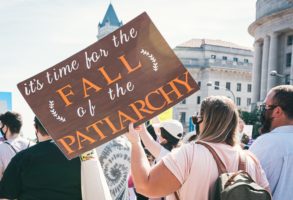
Published December 3, 2018
In the wake of this weekend’s sad news, many have noted that George H.W. Bush strikes us now as a figure from another era. Bush’s career spanned that era, and his death should move us to think about what it got right and wrong, and what we have done since.
On his 18th birthday, six months after Pearl Harbor, Bush signed up for the Navy and served until a month after the Japanese surrender. From then on, from Yale through his time in the oil business in Texas, and on to Congress, the UN, the RNC, the CIA, and the White House, Bush moved through some of the key institutions of the postwar American and global order. It was an order built and sustained by the two generations that had fought the war together—the older generation of commanders and leaders, and the younger generation of soldiers and citizens.
At its core were a set of institutions and structures—diplomatic and military alliances, political arrangements, economic compacts, cultural forms and expectations at home and abroad—that these two generations built up in the wake of the war. They responded to victory in war by consciously constructing a new global order because they recognized that, even though they had won, the world after the war would be very different from the world before it. It would be defined by new conflicts as well as new opportunities, and avoiding another cataclysm would require intense effort and organization on a global scale.
George Bush’s life was a kind of catalog of some of these efforts and organizations. In the 1970s in particular, a decade of enormous strain on these institutions, he represented the U.S. in the United Nations (created in 1945), ran the CIA (created in 1947), and was our ambassador to China when it was at the nexus of a complicated Cold-War diplomatic architecture. He then went on in the 80s and early 90s, of course, to the pinnacle of political power as vice president and president.
And it was during Bush’s presidency that the global array of institutions and arrangements that took form in the post-WWII moment achieved one of its primary purposes. It is said in every remembrance of him that Bush “presided over the end of the Cold War.” This peculiar phrase is somehow more fitting than speaking of victory, even though the West decisively won the Cold War and watched its chief adversary disappear from the world as a political entity, in part because Bush more than anyone made certain that the Cold War ended fairly calmly and peacefully. He used his command of the post-WWII institutions and orders to navigate extremely treacherous terrain and help both East and West achieve something close to a soft landing. He got to see one of the great endeavors of his generation, and of his own professional life, to a close. And his instinct for stability and diplomacy allowed that chapter of our history to close relatively quietly.
But in no small part because of that quiet and calm, the West’s victory in the Cold War did not launch an era of institution building of the sort that followed the allies’ victory in the Second World War. Rather than a sense that the world after the conflict would be home to distinctly different dangers and opportunities, Western elites left the Cold War with a sense that the world that would follow it would be the culmination of the hopes and ambitions they had built up in the course of that conflict. Because it was not a single, intense conflagration but a long twilight struggle, the Cold War had come to feel like a norm and not a disjunction or breaking point. And because it ended without a bang, the post-cold-war era seemed like it might be an extension of that norm but free of the obstacles liberalism had faced in the decades of conflict.
This has been one source of the peculiar attitude we have brought to the post-cold-war world, which has now been our world for almost three decades yet somehow still doesn’t feel like home. In the 1990s, elites of both the right and left, in our country and around the West, came to believe that the end of the cold war would bring about an era of liberal peace, so that the challenge for us would involve helping market dynamism coexist with cultural diversity, and the question would be how to spread the bounty of both.
But that is not what the end of the Cold War brought. Rather, around the world it brought the resurgence of long-submerged forces: nationalism and populism, ethnic tensions and economic resentments. And it brought to a head the fraying of family, community, and civic institutions that had long been the opposite side of the coin of market dynamism and cultural diversity. These would be the challenges of the post-cold-war world—the challenges that would torment the West in the early 21st century. They are not insurmountable challenges. And the benefits of market dynamism and cultural diversity are real too, and can play key parts in helping us to address our problems. But surmounting the challenges of this new era requires us to see them and acknowledge them, which we have not done well enough.
In retrospect, something of their character could have been evident in the kinds of crises the world faced in the mid- and late-1990s in the Balkans, in Africa, and elsewhere. And it certainly might have been evident in the rise of radical Islam and in the challenges that followed the American response to it in the early 2000s, and in the kinds of cultural and political debates that have swamped the West’s politics since. But the inertia of our Cold War order has, understandably, been very strong.
In America in particular, it has also had to do with the peculiar political dominance of the early baby boomers, who were born immediately after the Second World War and whose lives were therefore fully formed in the era shaped by these institutions. Consider for instance the odd fact that Donald Trump, George W. Bush, and Bill Clinton were born in June, July, and August of 1946, respectively. They come from the same moment—and it’s not just any moment. Like the institutions of the Cold War West, they were conceived (so to speak) the instant the Second World War ended. Barack Obama is younger, of course, but his intellectual categories and modes of governance often felt like a string of early Baby Boomer clichés nonetheless. Our politics in general has had real trouble seeing past those modes and categories, and for understandable reasons. For much of the three-decade period since the end of the Cold War, our politics has felt like it was waiting for some strange moment to pass so things could get back to normal again. (I offer all this, of course, in an unavoidably careless shorthand; I lay the case out in greater detail in my 2016 book The Fractured Republic.)
Donald Trump has surely hastened the end of that illusion. Although he is at least as besotted with a very selectively-recalled mid-century America as our other early-Boomer leaders (they differ in their selections, to be sure), his ignorant failure to understand the purpose of any of our Cold War-era institutions in the first place has served him oddly well in allowing him to criticize their faults when others won’t. This has opened some space for thinking about the purposes of our military alliances, economic agreements, and diplomatic postures. But Trump himself is horrendously ill-suited to actually doing that thinking, or even to enabling his administration to do it. We can hope to get through this period without paying the price for his unfitness and degeneracy, and so in time to take up these long-neglected challenges. But this period is the sorry end of the era of the post-Cold-War illusions, not yet the beginning of a new or next phase in our politics. Seeing this opportunity created by the Trump era while keeping our eyes open to the enormous dangers created by the Trump era has not proven easy for anyone.
Trump is a kind of complete opposite number to George H.W. Bush—he is a man of low character with no experience or knowledge relevant to the presidency but an instinctive grasp for the way crises can create opportunities. Bush never faced such a person, but in a sense his career was ended by a set of forces not so different. As much as he was defeated by Bill Clinton, Bush was cut down by the combination of Pat Buchanan and Ross Perot, which isn’t a bad way to describe Trumpism.
Recalling his successes and failures this week should help us take our own challenges more seriously. Bush was right to suggest that the end of the Cold War called for something like, as he famously put it, a new world order. But it was not for him to envision and instantiate that order. He had done more than his share, and in any case the electorate chose to try someone else. But what followed was not a new order of institutions and arrangements so much as an effort to squeeze every last drop out of the Cold War order and avoid the challenges that arose in its wake.
Donald Trump has surely hastened the end of that illusion. Although he is at least as besotted with a very selectively-recalled mid-century America as our other early-Boomer leaders (they differ in their selections, to be sure), his ignorant failure to understand the purpose of any of our Cold War-era institutions in the first place has served him oddly well in allowing him to criticize their faults when others won’t. This has opened some space for thinking about the purposes of our military alliances, economic agreements, and diplomatic postures. But Trump himself is horrendously ill-suited to actually doing that thinking, or even to enabling his administration to do it. We can hope to get through this period without paying the price for his unfitness and degeneracy, and so in time to take up these long-neglected challenges. But this period is the sorry end of the era of the post-Cold-War illusions, not yet the beginning of a new or next phase in our politics. Seeing this opportunity created by the Trump era while keeping our eyes open to the enormous dangers created by the Trump era has not proven easy for anyone.
Trump is a kind of complete opposite number to George H.W. Bush—he is a man of low character with no experience or knowledge relevant to the presidency but an instinctive grasp for the way crises can create opportunities. Bush never faced such a person, but in a sense his career was ended by a set of forces not so different. As much as he was defeated by Bill Clinton, Bush was cut down by the combination of Pat Buchanan and Ross Perot, which isn’t a bad way to describe Trumpism.
Recalling his successes and failures this week should help us take our own challenges more seriously. Bush was right to suggest that the end of the Cold War called for something like, as he famously put it, a new world order. But it was not for him to envision and instantiate that order. He had done more than his share, and in any case the electorate chose to try someone else. But what followed was not a new order of institutions and arrangements so much as an effort to squeeze every last drop out of the Cold War order and avoid the challenges that arose in its wake.
Conservatives in particular should see that the need for new institutions and orders does not mean starting over, or imagining the world has changed fundamentally. It means preserving the best of what has served us in the past and applying enduring principles to some novel realities. An applied conservatism requires us to attend carefully to the actual circumstances we are living in, and that’s what we in the West have done poorly since the end of the Cold War. And it requires us not to forget our principles, as Trump’s amoral circus act invites us to do, when we do recognize that the world demands something hard.
Nothing about this will be easy. But we are in the process of a hard landing that might force us to grapple with some of the challenges that George H.W. Bush’s impressively orchestrated soft landing allowed us to ignore.
That means, in part, that the coming years will need to be a time of institution-building and rebuilding, which—to put it very mildly—isn’t exactly what our political culture is good at right now. We’re going to need to hone and appreciate the qualities of genuine prudence (the definition of which is very far from caution), and we’re going to need people who—like Bush—want to invest themselves in institutions as patient insiders and not just to build themselves up as angry outsiders.
In mourning his passing, we should pray for the wisdom to build on what Bush and his generation left behind. They were far from perfect, but we were awfully lucky to have them.
— Yuval Levin is the editor of National Affairs and a fellow at the Ethics and Public Policy Center.








